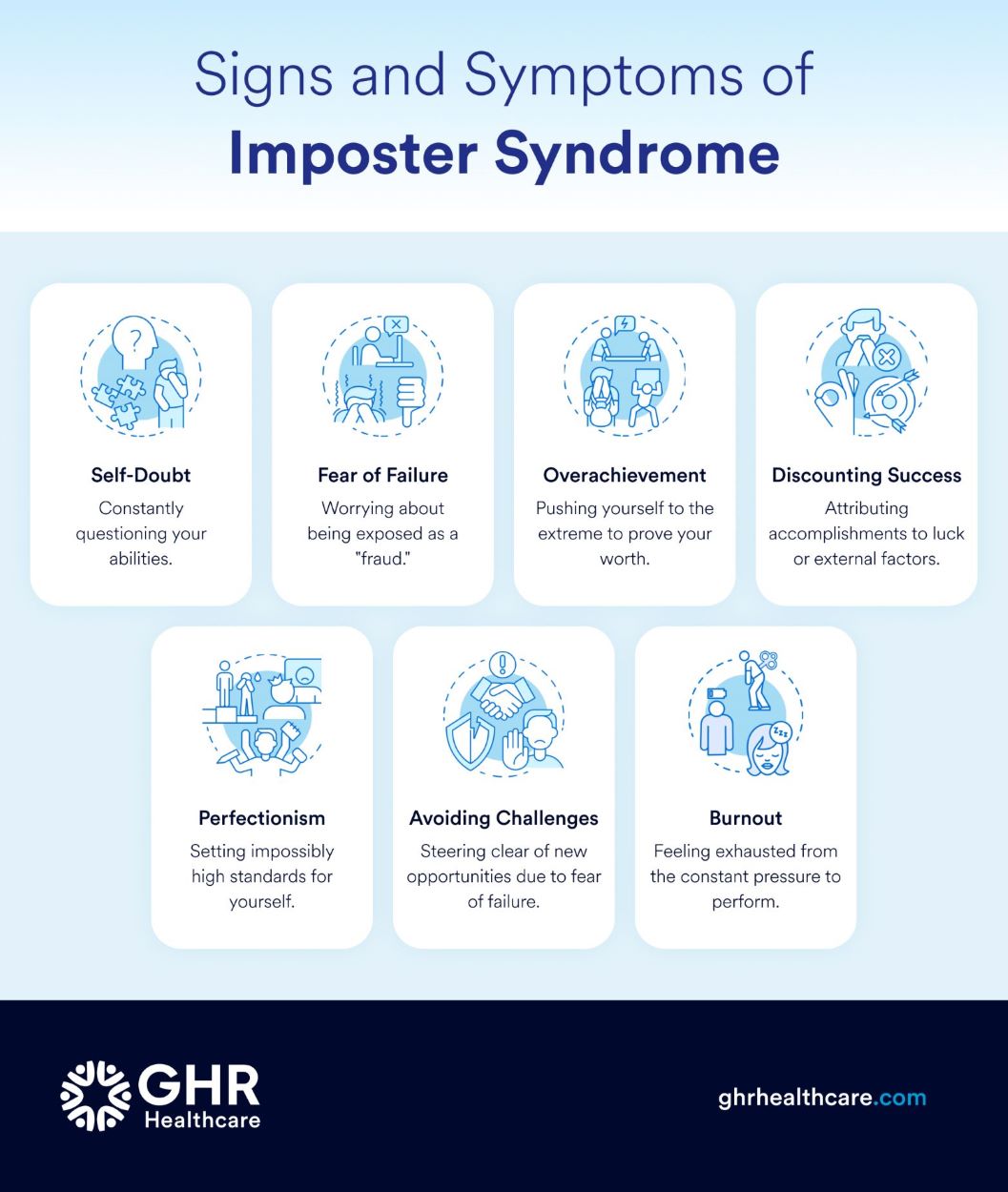
How to Overcome Impostor Syndrome
September 30, 2024

“No matter what we’ve done, there comes a point when you think; how did I get here? When are they going to discover that I am, in fact, a fraud and take everything away from me?” – Tom Hanks

“Every time I took a test, I was sure that it had gone badly. And every time I didn’t embarrass myself – or even excelled – I believed that I had fooled everyone yet again. One day soon, the jig would be up.” – Sheryl Sandberg

“I have written 11 books, but each time I think, ‘uh oh, they’re going to find out now. I’ve run a game on everybody, and they’re going to find me out.’” – Maya Angelou
Have you ever felt like you don’t truly deserve the success you’ve achieved at work? Has self-doubt and negative thinking led to low self-esteem? If so, you may be suffering from imposter syndrome, also known as the imposter phenomenon.
But exactly what is imposter syndrome at work, and what can you do about it? Learn everything you need to know, including how to combat imposter syndrome, in this guide.
What Is Imposter Syndrome at Work?
Imposter syndrome is a psychological phenomenon of feeling like a fraud, even when there’s clear evidence of your competence. Many healthcare workers experience imposter syndrome in the work environment due to the high-pressure nature of their roles. Even high achievers can experience feelings of inadequacy and a fear of failure.
Other signs of imposter syndrome include self-doubt, negative thoughts, attributing success to luck, and a constant fear of being exposed as a fraud. These feelings can eat away at your self-confidence and cause you to overwork yourself.

Causes of Imposter Syndrome in the Workplace
So what is imposter syndrome at work? As explained above, it’s the sense that you don’t deserve your professional success or position. Imposter syndrome in nursing, for example, is a common problem that arises with the high expectations of the role and the need to constantly adapt to rapidly changing situations. Below is a list of other potential causes for this phenomenon.
People experience imposter syndrome when they:
- Set high expectations for themselves that are unrealistic
- Adopt a perfectionist mindset
- Work in competitive industries
- Face high standards and rapidly changing environments
Any one of these factors can make you feel like an imposter. If more than one of these attributes describes your work environment or mindset, you may be at a greater risk of experiencing imposter syndrome.
Effects of Imposter Syndrome on Work Performance
Imposter syndrome can drain your mental health and lead to burnout. Your mental well-being may be impacted by negative self-talk, which reduces your productivity and causes you to second-guess yourself.
The fear of being exposed can lead to anxiety and make it difficult for you to focus on tasks or engage with colleagues confidently. If you don’t address your feelings of inadequacy and reframe your mindset, imposter syndrome can impede your long-term career growth.

How to Overcome Imposter Syndrome at Work
Here are some strategies to help you beat imposter syndrome and realize your full potential.
Get Prepared
If you are stepping into a new job that involves additional responsibilities, you may feel like an imposter. Combat these feelings by familiarizing yourself with the scope of the new role. Listen to podcasts and talk to people you know in the field to regain your confidence. Do everything you can to prepare yourself for the opportunity.
Make sure you view a job and the new challenges that come with it as just that: an opportunity to thrive and grow as a healthcare professional. You’ve put in the hard work and can now reap the benefits of all your efforts.
Let Go of Perfectionism
While it’s important to hold yourself to a high standard, you must also practice self-compassion. No one is perfect. Instead of chasing perfection, focus on continuous improvement and becoming a little bit better each day.
If you are a numbers-oriented person, use performance data as a form of validation to demonstrate that you are getting better at using your new skills. You can track metrics like:
- How long it takes you to work up new patients
- Your data entry accuracy rate when entering information into your work platform
- Your overall performance
Anytime you make improvements, show yourself a little appreciation with some positive self-talk.
Challenge Yourself to Shift Your Mindset
The way you talk to yourself matters. Change your line of thinking by replacing negative thoughts like “I’m not good enough” with “I’m capable, and I’m continuously getting better.” This technique can boost your self-esteem and help you realize your full potential.

Recognize and Acknowledge Your Achievements
One powerful way to counter self-doubt involves tracking your accomplishments. Think about all that you’ve achieved. Every time team members praise you or you learn a new skill, make a mental note of it. You can even keep a list or journal of your achievements to serve as a reminder of your abilities when imposter syndrome tries to creep back in.
Whenever you achieve an especially significant accomplishment, celebrate it. Go out to dinner with friends and family, buy yourself something nice, or maybe even take a day off. Just make sure to do something that reinforces the idea that you deserve your career success.
Talk About It
It’s easy to feel like you’re the only one experiencing imposter syndrome. The truth is that many professionals go through it. Open up about what you are feeling with trusted colleagues or mentors. Sharing your feelings can be a great way of accessing support and relief. You may realize that others share similar experiences, and you can learn from their coping strategies.
Seek Feedback and Mentorship
Mentors and supervisors can offer reassurance and guidance. Seek feedback to get an outside perspective on your work. A trusted supervisor can help remind you of your contributions and how valuable they are to the team.
A good mentor can also provide tips for how to develop your confidence. For instance, they may encourage you to take on new challenges or step into a leadership position at work.
Set Realistic Goals
Feelings of failure can snowball, especially if you keep setting unrealistic goals for yourself. Instead, focus on aims that are realistic and achievable. Break larger tasks into smaller, more manageable steps and celebrate progress along the way.
For instance, perhaps you want to go back to school to obtain your master’s degree. Instead of deciding that you want to complete your program in 18 months, set smaller goals that are realistic. For example, you could aim to start the program within three months and set another goal of getting an “A” in your first class. Build some momentum and use it to unlock your full potential.
Find Support Through Imposter Syndrome With GHR
Do you need help beating imposter syndrome at work? GHR Healthcare specializes in matching healthcare professionals like you with exciting job opportunities where you can thrive. Our recruiters are passionate about employee well-being and professional growth.
We will connect you with resources and opportunities that contribute to your long-term success and empower you to unlock your full potential. Contact our team to learn more.
Subscribe to GHR's Blog Newsletter
Your submission was successful.
Thank you for subscribing — we'll be in touch!





